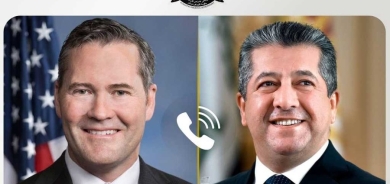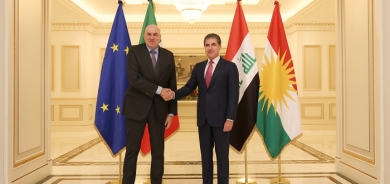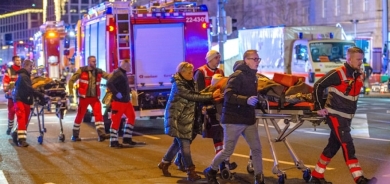Gordon L. Bowen to Gulan Magazine:Obligations of the International Community is to speak on behalf of the human rights of the people of Syria
March 13, 2012
Exclusive Interviews

Gordon L. Bowen is Professor of Political Science and International Relations in the Department of Political Science at Mary Baldwin College. We contacted the Professor Bowen to discuss the current situation in the Middle East; in particular the Syrian situation and he replied to our questions in an exclusive interview to Gulan Magazine as the following:* The International community has two options, either Assad steps down peacefully or the Syrians should end the revolution but none of the options are possible, is it possible to keep silence toward Syria?
- Obligation of the international community is to speak on behalf of the human rights of the people of Syria that are being greatly violated by this severe repression. Our voices probably not enough to bring the Bashar Assad regime to an end, but I think uniform condemnation of the extreme repression would help to make the inner circle aware of the great consequence if they continue this way. The incitement recently a couple years ago of the president or the leader of Sudan should send the message that there are limits to how far you can go in treating your people so roughly. So; I hope that Mr. Assad is staying informed broadly of what people saying outside government and civic activists, and human right activists this needs to have sharp attention paid.
* Assad’s forces still powerful; the violence is still increasing and more people are getting killed on daily bases, and the Assad regime is killing civil people with no mercy, meanwhile no country is supporting the Syrian opposition. In your view: why this is happening? Do you think that the countries feel afraid of supporting the opposition or the Syrian people?
- If we make a small comparison with maybe we can see the answer to your question. When the problem has significant parallel in Libya last year, there was full-consensus achieved at the United Nations’ Security Council, and the Russians were in support – at least of the resolution to authorize the Arab league and NATO to act on United Nations’ behalf – and this helped to assist the Libyan liberation by themselves, by the Libyan people. Another situation is not in parallel the same in Syria because of the sectarian ramifications of the conflict between the mass of people and the Alawites elite that have rule for so long. There is also this much tighter alliance between Russia and Assad family, that in combination with the timing of the Russian election right now which makes it difficult for Mr. Putin to see the Russia’s larger interest as a constructive force rather than as a campaigner to look strong against the west and all of these things are for domestic conception in Russia. This makes it very difficult to achieve a full-consensus at the Security Council. And in the absence of that; I think the Arab league has been less bold than the Libyan case. So; these external factors may change after the Russian election is finished and Mr. Putin can again assume position of war leader rather than a national organizer for the vote for himself – at least that is my hope. I can much hope on the rational perception of the interest of states and this recent division at the Security Council on this matter is very troubling because it seems to point toward future blocks of states against one another, caring out conflicts in small countries. So; in that moment we are in right now maybe there will be change in a month after the Russian ballot day, that’s the only hope I have for a greater external action. Now; to follow logically, if nothing changes with the international community, if – as you say they vanished or run away – America has for example closed its embassy. So; you are right in saying the world community, the Arab league, the big states are mostly just trying to ignore this problem, but the problem is getting worse. And I think regional actors; especially Turkey may be forced to do something in their own interest because of the refugee problem which will increase and will not get smaller in the week or month ahead. This change could assist the rebels inside Syria militarily, but so far it has not happened on a large scale. So; my heart is saddened by the great level of violence that is what the people of Hummus and other places in Syria have to endure.
* Russia and China are supporting Assad, therefore; many experts believe that the other countries like United States, the EU, the Arab league and Turkey as well can collectively take a decision apart from UN, similar to the case of Iraq. In your view; do you think that it is possible to make decisions outside the United Nations?
- The different is in the attitude at the governing level in the United States; Mr. Bush was contemptuous of the United Nations, didn’t hold the United Nations in high regard in general, and an extra step of approval from additional resolutions about Iraq were only thought half-heartedly – with the limited effort – because the general philosophy of Mr. Bush was of unilateralism, not of working through the legitimate international organizations. In this sense; Mr. Obama is much more inclined to – as they say in the Libyan operation – lead from behind; to not attempt to be the grand superpower, that I think was an attitude of Bush that may be developed too much, we had too strong that attitude. So; I don’t think that the British or French are eager to operate without solid cooperation with the Americans. And to this point; the local international organizations, the Arab League, is not openly advocating in military intervention by either the League or by any coalition of the willing. So; the security threat opposed in the case of Syria in terms of the wider interests of states is not as profound as it was perceived at that time of the overthrow of Saddam – the danger to other countries – I think it is large in Syria, but I don’t think the perception is there that it is large. And the unanimity among the allies of the west to take action, the justice is not the chemistry there for Mr. Cameron, Mr. Sarkuzi and Mr. Obama to behave the way that Blaire and Bush did, to more or less, wave goodbye to the United Nations and go ahead anyway. I just don’t see that the will to act, and in some way the absence of the authority of the United Nations may even be a cover, a mask, behind which to hide the lack of will to act, which I think the Obama administration is war-weary; tired of war all together, not anxious to intervene in Libya or here in Syria, egger to leave Iraq, now speaking of a fast timetable to leave Afghanistan. All of this suggests a very high pressure of other countries pushing the United States before Mr. Obama would choose a military option. I don’t agree with this attitude of the Obama team but I think my reading to it is correct. So; the Syrian people, for better or worse, are more or less on their own, and it is a very ugly isolation they face, it saddens me each day to see these images. Not at all what the promise of liberation at Tahrir Square last year seems to open the door. The door seem to be opening to the power of the idea of self-role overcoming and trenching dictatorship, and now it is a very dark room that is on the other side of the door, there is not that happy promise.
* Many observers think that the United States is worry about Syria after Assad because the successor of Assad is not clear yet. In your view; to what extent do you agree with this? Do you think it is fair to let things go on this way only because they don’t know whose going to replace Assad?
- This may be a convenient new condition to hide behind in order not to act, because there was no clear opposition leadership in the Libyan case either, there were many former diplomats who presented themselves as anti-Gaddafi spokespersons, but they had no control of the rebels on the ground, and many militias were forming from the grassroots, not from some commanding control of the system, and yet NATO could act and yet the support was widespread for action. So; I don’t know a clear single leader of the Syrian liberation forces is a minimum condition for action, I suspect if one emerged he would be said to, you know; “not have the right credential, we are still looking into his past”, there will be a new excuse to not intervene. I think some of this may reflect reluctant to go down the road of conflict with what is perceived as an alliance between Russia and Syria and Iran, and because of this; overstated perception – that I think there is this perception – the issues may linkup together, if not in immediate moment, later; if operations go badly in relation to other problems such as the threats of Hummus. So; in this situation the basic controlling factor is this attitude in the White House; of desire to quickly remove from wars in the Middle East – as the phrase I used “War-Weariness” – the sense that this is not a winning legacy for this president, that he wants to be remembered as the president who ended not began wars, and as a consequence they don’t even speak of these operations like the one against AL-Alaki or Ben-Laden. They are extremely determined to go in that verbal direction, and I think it carries over the way that they think about these problems. If there is a firemen to come to put the fire out in Syria; it will need to be the Arab League, or the Turks, or someone else, and if there is an American component; this White House want to be begged, they want people to urge them to do it before they will act, they are not leading toward a new conflict, or toward involvement in conflicts already. This is not the approach I think a great power should take, but it is the approach that is for the president probably for the next five years.
* Saudi Arabia is in favor of the change of Assad’s regime, but it used to support the Bahrain regime to stay in power, in your view; how do you interpret this? Don’t you think that the outsiders are behaving in accordance with their interests?
- I don’t think that there is a larger Sunni versus Shiite theme in all of this. I think that some analysts say that this is the direction of the whole region, and I don’t think so; I think that each state is attempting to magnum by its own influence, and the behavior of the Saudis in regard to Bahrain; this is almost as a special issue, a bit like the United States behavior towards Mexico. This is right on their border, it is seen as a strategic matter different from others, and as the Saudis have their own internal security problem to worry in the eastern provinces. So in that sense; their behavior about Bahrain is dictated by a different level which is driving them in this question. On the matter of Syria; I think that many states are taking cynical positions, positions that are convenient, that don’t cost much; taking the moral high ground to condemn all this, but then doing nothing to stop it. It’s very disturbing. But; if I were a Syrian I think I would be trying to leave, I don’t like the odds in this particular conflict – “Odds” is the term that refers to playing games of chance – I don’t think that the game of chance here is likely to favor of the opposition. I will be pleased to be surprised to be wrong, but I don’t think so.
* Last Question: To what extent do you think that toppling Assad will change the power balance of the area, in particular regarding to accesses to Israel, Lebanon, Saudi Arabia, and Iran, including the United States interests as well?
- This may be one reason why there is such slowness to embrace the opposition, what it will create if they win is very unclear because this will be a revolution in which the leadership maybe considerably more radical than the gentleman who received Mrs. Clinton in Tripoli. I'm not saying violence always produces extremists, but the more protracted the violence the longer it goes on the more likely extreme elements in the Syrian revolutionary forces will be the one who prevail in the end, which could have very serious implications for all of the neighboring states, but already there is some small evidences that AL-Qaida in Iraq may be participating in the Syrian uprising, and if not the actual organization AL-Qaida in Iraq, then tactics and methods that have been learned through the conflicts in your country are being embraced; that there had been some bombings of security buildings and military that suggest methods similar to what you have as a problem in your country. This long war has been going on since almost a year in Syria, this could unravel a great anger that would set in a more radical regime even than what we have seen elsewhere around the region, and then it would have a popular base to support of more extreme policy. This is not likely to be in the interests of any of the states in the neighborhood, and this may account for why there is so much talk but so little action to help the Syrian rebels. Syria has always been in a very delicate balance of competing interests, and the Assad family managed through rough means to keep themselves on top of all this for the whole of your lifetime probably and the most of mine, they have been in running a very efficient dictatorship, but the level of frustration that we are beginning to see in the opposition suggest that there going to be pretty unforgiving of; not just people directly connected to the Assad group, but also there is a wide perception that the whole Alawites population and some others may themselves be implicated. There could be a real bloodbath after the victory of the opposition forces. So; it is a very dark situation that is developing as the long as this war goes on. And I don not think that it serves the delicate balance in Lebanon, Turkey, Israel, or Iraq to have a war situation and a sort of a bleeding conflict next door in Syria over the next couple of years, that is likely, but I don’t really have a good solution. I think that the best solution is that the Russian election gets completed, Putin becomes a world statesman again instead of acting for the crowd at home, and then all of a sudden there is consensus to do something at the Security Council and face with that threat Mr. Assad gets an airplane and flies to Tehran or anywhere else.
Transcript: Mahmud Samih















